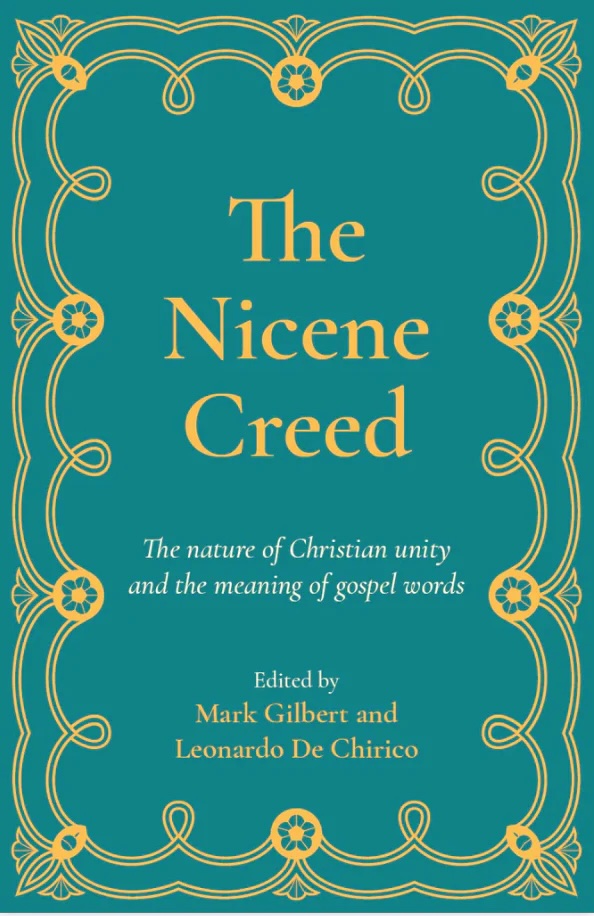Mark Gilbert and Leonardo De Chirico have edited an incisive series of essays in The Nicene Creed: The Nature of Christian Unity and the Meaning of Gospel Words. These essays respectfully seek to illuminate the fundamental difference between Protestantism and Roman Catholicism with the Nicene Creed as the backdrop for analysis.
The post-Reformation landscape
2025 marks 1700 years since the Council of Nicaea (modern-day Izmir in Turkey), which created the earliest version of what would later be expanded to become the Nicene Creed. That Creed was created to articulate the boundaries of Christian orthodoxy: what we must confess to be a true Christian. To this day, Roman Catholics, Eastern Orthodox, and Protestants agree on what that Creed teaches regarding the nature of the Triune God (with some quibbles by the Orthodox about the precise nature of the Spirit’s relationship to the other two Persons). If we all agree that the nature of God himself has primacy in Christian belief, do other disagreements really matter? How much should we argue over the precise specification of things like the relative authority of the Bible and the church and the relationship between our faith in Christ and our works? For all our protestations about being Biblical, are we Protestants disobeying Jesus’ prayer that we all be one (John 17:21, cf. Eph 4:3-6)?

Mark Gilbert and Leonardo de Chirico
How far can the ‘unity’ of the creeds take us? What if we say the words but we’re not sure what they mean? Or what if different people use the same words to mean different things? Can believers from Catholic and evangelical backgrounds find genuine unity in the creeds?
In this book a team of experienced Bible teachers, pastors and scholars examine the creed afresh from an evangelical perspective. Together, they offer a compelling vision for the creed’s place in the Christian life.
Understanding Roman Catholicism
This book arises from a conference by the Reformanda Initiative, which exists to equip Protestants to understand Roman Catholic doctrine and ministry, reinforce the significance of Protestant doctrine, and equip people to evangelise Roman Catholics. The book demonstrates that even if we nominally can agree with the Nicene Creed, the disagreements between Catholics and Protestants are significant enough for us to recognise that we are worshiping different Gods, in different ways, with fundamentally different views on what it means to relate to that God.
Why a Nicene Creed?
Rachel Ciano (chapter one) shows how the Creed’s initial reception demonstrates the inadequacy of merely professing adherence to the Creed. The Creed was formally ratified in part because of the Emperor Constantine’s desire for religious uniformity across the empire. However, Arian teaching continued to be much more common than Nicene orthodoxy. It took the efforts of the Cappadocian Fathers at the council of Constantinople in 381 for the Triune faith to become ‘catholic’; that is, believed and taught in all the churches. Alastair Dunlop (chapter two) sets out a classically Protestant explanation of Scripture’s final authority over even the church, which differs from the Catholic “three-legged stool” (p. 28) of Scripture, the church’s historical tradition, and its contemporary teaching. In practice this means “Scripture never has the final word” (p. 29) in Roman Catholic teaching because Scripture is always interpreted through the other two legs. These first two chapters are important rejoinders that set the groundwork for the rest of the book. The remaining chapters show how mere profession of the Creed continues to be inadequate for true church unity. Unbiblical beliefs about the nature of God and humanity permit unbiblical ideas about the relationship between them, and these distort the interpretation of the Creed so that we are not actually confessing the same faith.
Whither Roman Catholicism?
Leonardo De Chirico (chapter three) begins by showing how the Catholic understanding of the nature of God and creation minimises sin, maximises human ability to obey God, and through their sacramental system interposes the Church between Christ and his people so that obeying God becomes obeying the Church. Matthew Johnston (chapter four) reinforces this by explaining how the Catholic view of the union between Christ and the Church permits Catholic priests to be “an alter Christus, another Christ, who possesses Christ’s “sacred power”” (p. 64, emphasis in original). Robbie Bellis (chapter five) similarly demonstrates how Catholic optimism about human abilities ends up denying the completeness of Christ’s sacrifice. “According to the Catholic Church,” Christ’s sacrifice cannot completely satisfy God, because “we must cooperate with God” through the Church’s penitential system and thereby “make some contribution to our own salvation” (p. 77). Greg Allison (chapter six) explains the Catholic sacramental view of the Holy Spirit:
“the seven sacraments… through the operation of the Spirit, impart invisible grace that transforms the very nature of the Catholic faithful, enabling them to engage in good works and thus merit eternal life”(p. 91).
Mark Gilbert (chapter eight) continues all the above themes as he contrasts the Biblical, Protestant view of the universal church as “an expression of the unity that our one God creates through his Spirit amongst those who have faith in Christ” (p. 126) with the Catholic institutional and sacramental view. In the last chapter (eleven), Bradley Green contrasts Catholic doctrinal decline with Protestant recovery and clarification of the faith.
Chapters seven, nine, and ten highlight the heretical nature of traditional Catholic theology. Clay Kannard’s chapter (nine) on baptism shows how Catholic sacramentalism makes Catholic ecclesial baptism simultaneously essential yet insufficient for salvation. On the one hand, “Roman Catholics believe baptism causes new life in Christ” (p. 134, emphasis in original); “it objectively effects spiritual regeneration and opens the door to a life of faith,” (p. 133, emphasis in original). However, where Protestants understand faith to be casting of ourselves upon Christ in joy and because of our own helplessness, Catholics define faith as obedience: obedience to God through obedience to God’s present-day representative on earth, the Church. Reid Karr (chapter ten) demonstrates how the Catholic union of Christ and the institutional Church permits the Church to exercise nothing less than Christ’s final, divine judgment over people. To obey the ministers of the Church, whether priest and Pope, is therefore to obey God. And Lauren Montenegro (chapter seven) shows how
“[m]any Roman Catholics love Mary and have a powerful emotional attachment to her… [as] their own spiritual mother, … [therefore] [a]nything short of reverence for the virgin Mary can be regarded as offensive,” (p. 108) “The discrepancy between what Roman Catholics and evangelicals see in Mary is significant enough for us to question if we are making the same statement of faith when reciting the Nicene Creed” (p. 110).
The book is not only polemical. It sets out the proper, Biblical, and Protestant view of the creed: Trinitarian monotheism, one God in three persons as the universal creator and redeemer; the full and eternal deity of Christ; Jesus’ true union with humanity; the completeness of his penal substitutionary atonement; his authority to judge; justification by faith alone; assurance of salvation; etc. The book’s one possible weakness, which is also a strength in a way, is the manner in which Protestant and Roman Catholic theology is woven into the discussion of the Creed. It’s an exhibition and refutation of Roman theology, in comparison with Protestant theology, against the background of the Creed. The various authors achieve those three goals in different ways. Depending on your preferences for reading, that can be messy or interesting.
Gilbert and Chirico have compiled a thoughtful and thought-provoking volume. The questions at the end of each chapter help readers engage with the issues raised for themselves. This book will help thoughtful Christians delight in the Triune God and equip them to show their Catholic friends what it means to confidently know this God in Jesus Christ.















